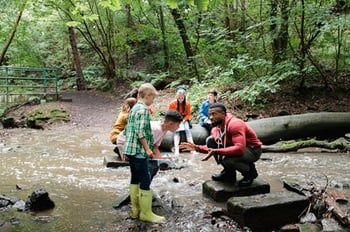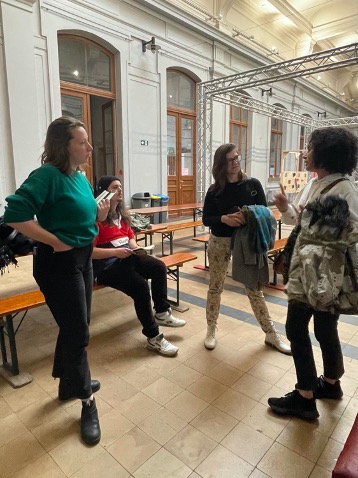This resource is also available in French. Click here to access the French version.
Many people think that the development of intercultural competence is not relevant to them because they “are open to cultural differences”, they have “lived abroad or travelled”, they “speak more than one language”, they have “friends from different ethnic or cultural groups”, or they are “part of a minority group themselves”. As these experiences do support the development of intercultural competence to varying degrees, stereotypes and prejudices are embedded in us from growing up, which can affect how we treat and engage with others, even without realizing it – so think again. Regardless of your past experiences, the development of intercultural competence is a lifelong process that everyone should engage in, despite the lack of comfortability it may bring.
What is Intercultural Competence?
Intercultural competence involves awareness, understanding, behaviours, attitudes, knowledge, and skills that allow individuals to effectively, appropriately, and positively interact with those who are different from themselves. Differences are not solely focused on nationality, race, and ethnicity, but it also includes disability, gender, sexual orientation, age, body size, social class, and education.
Importance of Intercultural Competence for Career Readiness and Development
Diversity is increasing all around us, including in the workplace, which has influenced what employers are looking for. Specifically, intercultural competence has been identified as one of the top 10 critical skills needed for employers in the 21st century.
According to the National Association of Colleges and Employers (n.d.), a key competency identified for career readiness and development is equity and inclusion, which heavily overlaps with the definition of intercultural competence. Key components of equity and inclusion include understanding and using cultural perspectives effectively, seeking cross-cultural interactions/experiences to increase understanding, and addressing marginalized communities.
Workplace and Organizational Benefits of Intercultural Competence
The development of intercultural competence among employees can have many workplace and organizational benefits. Some of the benefits are as follows:
• Promotes a peaceful and productive work environment with the reduction of cultural conflicts
• Allows employees to understand and value diversity
• Improves communication
• Brings new perspectives and creativity into the workplace
• Supports companies in meeting equity and inclusion goals
• Brings new perspectives, creativity, and solutions
• Attracts diverse clientele and enhances customer service
Following, I provide strategies to help develop attitudes, knowledge and skills related to intercultural competence.
Strategies to Develop your Intercultural Competence
 Attitude
Attitude
Attitude is the foundation of intercultural competence and needs to be developed before knowledge and skills.
- Respect culturally diverse individuals.
- Show openness by refraining from judgment or making assumptions and be open to learning about cultural differences, as well as exploring your own cultural views and bias.
- Show curiosity by seeking to understand different views, and having the desire to learn other about how both you and others behave in a cultural context.
Knowledge
Develop your own knowledge of culture by describing your own views of which you see the world and by discovering underlying cultural conditions and values that affect your own understandings and behaviours.
- Deepen your knowledge of other cultures by seeking out learning opportunities surrounding diverse cultural groups, specific cultural histories, and underlying cultural values/attitudes.
Skills
- Listen with the intention of understanding different cultures and viewpoints.
- Pay attention to the behaviour of others and yourself by thoughtfully observing interactions and nonverbal cues.
- Engage in active self-reflection following interactions.
Intercultural Competence within My Placement Experience
After learning about Intercultural Competence within my fieldwork placement class, I knew I wanted to learn more--it was an unfamiliar topic to me. I wanted to learn how I could develop intercultural competence in my personal and professional life to improve my communication skills. One setting I have been able to develop my intercultural competence is my placement with Niagara Peninsula Conservation Authority (NPCA). There, I was able to support children in youth through nature and curriculum-based programming, while applying and developing my own skills, like intercultural competence.
While going through the onboarding process within NPCA, I quickly learned that staff supported diversity and inclusion across the whole organization and their programming. They wanted all individuals attending their programming to feel welcomed, included, and supported, regardless of their diverse backgrounds or lived experiences. As NPCA is situated on the land of indigenous peoples and their communities, they incorporated these histories into their programming, as well as committing to a land acknowledgement at the beginning of programming. This approach was taken so youth could both learn about the histories of their land and indigenous peoples and encourage respect for the conservation areas in which they are participating in programming. In my day-to-day interactions with youth and staff, I approached situations with intention, curiosity, and openness. I worked to minimize and be aware of my own preconceived stereotypes and biases. Yet I realized this can be challenging and uncomfortable as they are often subconscious thoughts. Throughout the placement, I worked to actively engage in self-reflection within interactions and experiences by observing my own thoughts, attitudes, knowledge, and actions, as well as asking myself questions. I also asked how I could collaborate with my supervisors to incorporate cultural perspectives into programming and discussed how I can seek new opportunities to develop my intercultural competence.
In sum, my placement with NPCA has allowed me to further develop my intercultural competence by deepening my cultural knowledge and improving my communication within interactions with diverse individuals. I am now able to recognize the importance and value of intercultural competence for both my personal and professional life. This placement has also allowed me to begin looking at the world from views different from my own. But I still have a long way to go, as it is a lifelong process.
Learn more
- Read:
- Celebrate the World Day for Cultural Diversity by Amy Hunt
- Exploring interculturally competent teaching in social sciences by Darla K Deardorff
- What is Career Readiness by the National Association of Colleges and Employers
- Check out these books;





